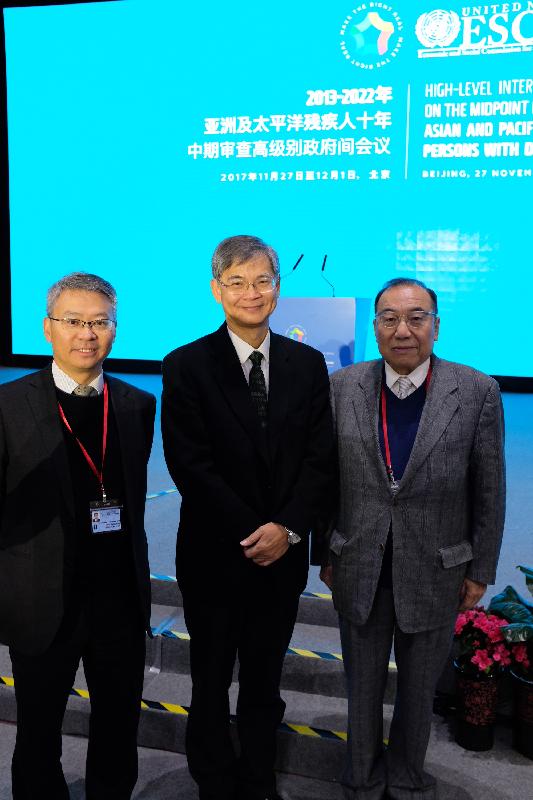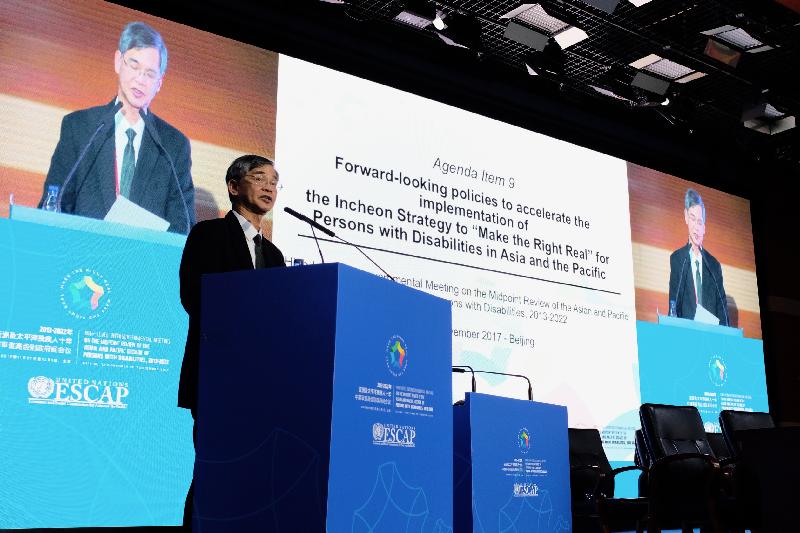Speech by SLW at high-level intergovernmental meeting on midpoint review of Asian and Pacific Decade of Persons with Disabilities, 2013-2022 (English only) (with photos)
******************************************************************************************
Madam Chairperson and distinguished Members,
It gives me great honour to share with you the Hong Kong Government's action plan of implementing the Incheon Strategy to "Make the Right Real" in the remaining five years of the third Asian and Pacific Decade of Persons with Disabilities (from 2013 to 2022).
Policy Objective
It is the Hong Kong Government's policy to ensure that every citizen of Hong Kong will not be denied access to basic education, welfare and healthcare services, irrespective of their conditions (i.e. with disability or otherwise), sex and age. Our education, welfare and healthcare services are our top three recurrent expenditure items accounting for about 60 per cent of the Hong Kong Government's recurrent expenditure.
In view of the limitation of time, I would like to focus on two of our recent priority service areas, namely "Children with special needs" and "Ageing persons with disabilities", which are related to Goal 4 and Goal 5 of the disability-inclusive development goals under the Incheon Strategy.
Forward-looking Policies
Expand early intervention and education of children with disabilities
There is a dire need for children from 0 to 6 years old who have special needs, e.g. autism, hyperactivity disorder, language disorder and other learning difficulties, to be provided with rehabilitation services as early as possible. Under the policy direction of "Early identification, timely intervention", the Hong Kong Government has been striving to provide premises-based pre-school rehabilitation services for children with special needs, including Early Education and Training Centre, and Special Child Care Centre.
To supplement these services, we launched in 2015 a Pilot Scheme on On-site Pre-school Rehabilitation Services for children with special needs studying in ordinary kindergartens. The Scheme has three innovative features:
(a) On-site service: to overcome site constraints under the conventional service model, we deliver outreaching rehabilitation services for children with special needs at kindergartens;
(b) Inter-disciplinary collaboration: rehabilitation services are delivered by multi-disciplinary service teams which comprise physiotherapists, occupational therapists, speech therapists, clinical or educational psychologists, social workers and special child care workers; and
(c) Zero waiting time: our policy intent is to achieve zero waiting time, as the pre-primary school stage is the golden time for effective intervention.
In light of the notable positive results, the Hong Kong Government has decided to regularise the Pilot Scheme from the 2018-19 school year. To achieve zero waiting time for services, we have earmarked an annual recurrent expenditure of about US$60 million for the programme and doubled the service places from 3 000 to 7 000 in the next two years, on top of our continued efforts of increasing conventional service places.
Strengthen social protection for ageing persons with disabilities
To keep our rehabilitation services updated for changing needs, including the ageing trend of our persons with disabilities (PWDs) population, the Hong Kong Government has embarked on the formulation of a new Rehabilitation Programme Plan. To tackle the ageing of PWDs, we shall adopt the following strategic directions in formulating the new plan:
(a) Promoting closer collaboration between the healthcare system and the welfare sector in the provision of rehabilitation services;
(b) Strengthening community care services to ensure that PWDs, despite their ageing, are able to stay in the community for as long as possible; and
(c) Promoting wider use of technology in the provision of rehabilitation services to improve the quality of life of aged PWDs. The Hong Kong Government will earmark about US$130 million for setting up a fund next year to subsidise the procurement of technology products.
Madam Chairperson, in formulating the new Rehabilitation Programme Plan, we shall give full regard to the spirit of the United Nations Convention on the Rights of Persons with Disabilities and the disability-inclusive development goals under the Incheon Strategy, and pay full respect for the diversity, autonomy and independence of PWDs. Thank you.
Ends/Thursday, November 30, 2017
Issued at HKT 18:52
Issued at HKT 18:52
NNNN




